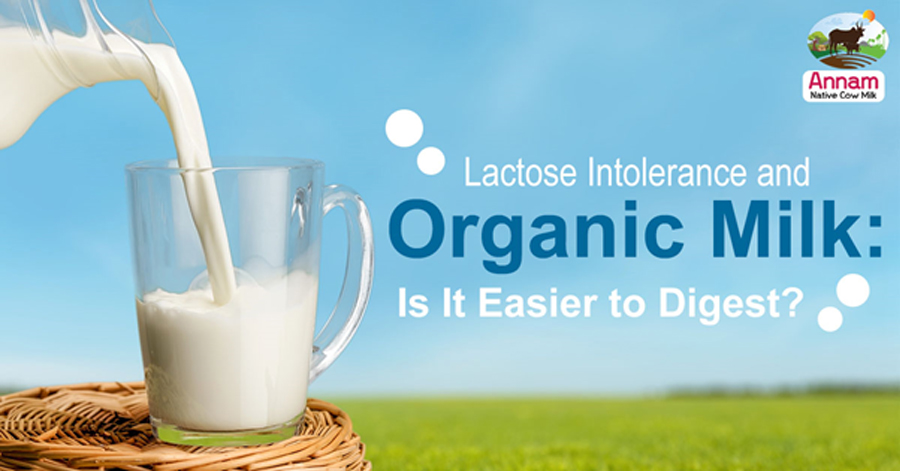When it comes to dairy products, people have a higher degree of variance in their gut response. Around 65% of the global population has lactose intolerance. People with lactose intolerance lack necessary gut microbes that help to digest lactose.
Lactose is a sugar compound found in milk. Failing to digest this compound results in malabsorption, stomach cramps and bloating.
But an alternative approach to milk production called organic milk production anticipates a change in digestive process both in general and lactose intolerant cases.
While evidence shows a clear difference between organic and conventional milk, it is essential to understand its characteristics, and benefits in relation to lactose intolerance.
Now, let us clearly understand the relation between organic milk and their digestive nature in lactose intolerant cases.
What is Organic Milk Production and How It Differs from Conventional Milk
Organic milk production involves feeding cows with a restrictive diet of organic fodder that is free of chemical stimulants, synthetic amino acids, industrial concentrates and antibiotics. It prioritizes the biodiversity in milk production over yield and commercial intentions.
On the other hand, conventional milk production emphasizes yield and nutritional value in milk production. Complete feeds, growth stimulants, feed produced with GMOs and synthetic concentrates are used in scale to bring nutritionally rich milk that is preferred by the masses.
Organic milk has higher whey protein, fatty acids, polyunsaturated fatty acids (PUFA), and minerals when compared with conventional milk.
It also has lower yields than conventional milk. This is due to the limitations on fodder and pastured fertilization. Diet systems in organic farms rarely meet the nutritional needs of cows where intensive methods give more yield.
Nutritional Comparison Between Organic Milk and Conventional Milk
Organic milk possesses higher fatty acid substances such as omega-3 and omega-6. They usually have lower n-3 to n-6 ratio and higher n-3 PUFA levels. It is also a valuable source of Omega-3 fatty acids such as EPA, DHA, and ALA.
Where, conventional milk has higher total protein and casein content. Studies have found that conventional milk has higher levels of minerals such as calcium (Ca), magnesium (Mg), zinc (Zn), manganese (Mn), and copper (Cu) when compared to organic milk.
In summary, organic milk has a higher profile of fatty acids where conventional milk has rich in minerals and proteins.
Another nutritional factor that is found to be common in both organic and conventional milk is beta-casein proteins and has several types of it. A1 and A2 are two of the most common ones.
A1 vs A2 Milk
The difference between A1 and A2 milk lies in subtle variation that facilitates digestion. A1 cow milk is produced from cow breeds such as Holstein, Friesian, Ayrshire, and British Shorthorn and A2 cow milk is derived from cow breeds such as Guernsey, Jersey, Asian, and African cows.
A1 milk proteins have beta-caesins may release peptide called BCM-7 (beta-casomorphin-7). BCM-7 tends to cause digestive issues. which is not the case with A2 milk proteins as it does not release BCM-7.
Hence, A2 milk is considered as an alternative for people with lactose intolerance to ease the digestive process of milk.
Lactose-Free Milk as a Best Alternative
People who want to enjoy the benefits of milk but are restricted by lactose intolerance can try lactose-free milk as a best alternative.
Organic milk is generally considered as easily digestible than conventional milk. It has a lactose-free variant in which they add lactase to the milk that breaks down the lactose into easily digestible sugar compounds.
Why You Should Try Lactose-Free Organic Milk
Studies show significantly greater response from people who consume lactose-free organic milk with positive impacts. They reported that they can able to consume dairy products without having to face gastrointestinal symptoms.
It allows you to attain the benefits of milk while being able to immune against lactose intolerant symptoms.
Try lactose-free organic milk with Annam Milk – Chennai’s leading organic milk supplier. Annam Milk provides organic milk in Chennai produced with a strict adherence to organic farming and cattle rearing methods. We deliver authentic dairy products that are organically produced to a higher standard.



